My international peers see me as a representation of Latvia. Interview with infectologist, Prof. Dace Zavadska
Linda Rozenbaha, RSU Public Relations Unit
Photo from private and RSU archives, as well as publicity photos
We recently witnessed one of the most beautiful events at the Rīga Stradiņš University (RSU) - the Academic Ball. The RSU Annual Awards are presented at this event. Last year, the Researcher of the Year Award was given to Dace Zavadska, Professor at the Department of Paediatrics at the RSU Faculty of Medicine, and Lead Researcher at the RSU Institute of Public Health. She is one of Latvia’s leading infectologists, probably known to many in relation to the COVID-19 pandemic when she actively commented on issues related to the pandemic as a doctor and Chair of the National Council for Immunisation.
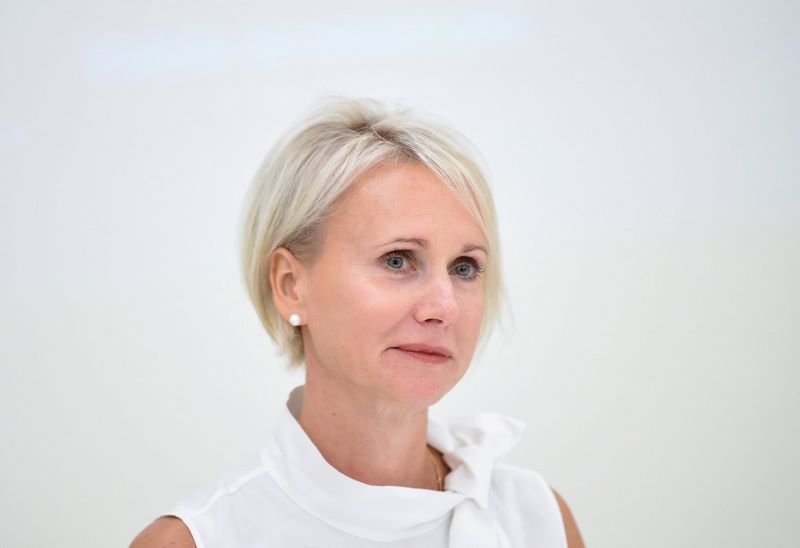
When nominating the professor for the award, the RSU family particularly praised her active participation in clinical research and large-scale international projects, her scientific publications and ability to promote RSU in the media as a place that creates new researchers. Her research areas include immunisation, vaccination, and infectious diseases in children.
How did you feel when you received the award last year?
I was definitely surprised at first. I appreciate this recognition very much, because it is a great honour to be nominated by representatives of the University, such a large academic institution. I would like to emphasise very, very strongly that the success for which I was awarded the prize is not mine alone. Everything that is achieved in research is a team effort. Someone is probably the driving force, but the result is definitely thanks to the team.
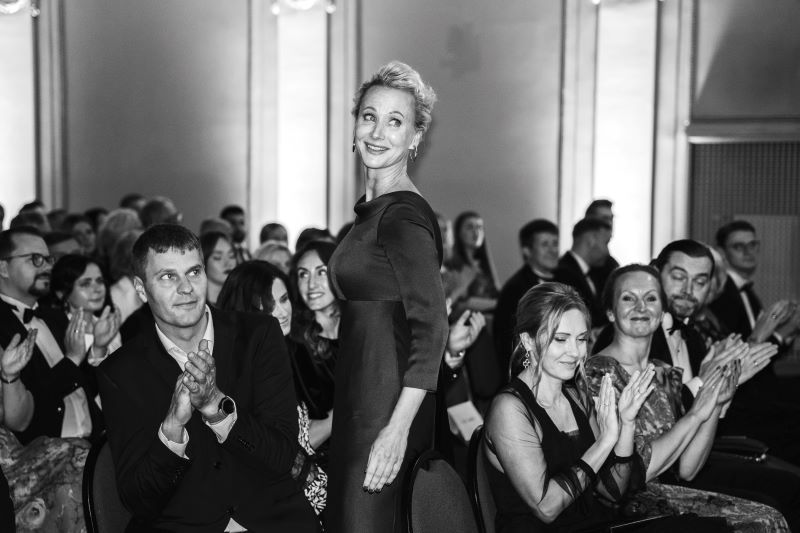 Prof. Dace Zavadska during the presentation of the RSU Annual Awards in 2023
Prof. Dace Zavadska during the presentation of the RSU Annual Awards in 2023
I would like to thank my very supportive clinical colleagues, with whom we have achieved a lot over the years. I would also like to thank the administrative team, because as a scientist, I can generate and implement ideas, attract sponsors, but find all the administrative work cumbersome and complicated. My colleagues do it very efficiently - I could deal with it if I had to, but it would reduce my drive to keep going and start something new. I am a first and foremost a clinician and a scientist.
Surely this is what enriches your perspective and helps you to see more - to study what you have noticed in practice and to put into practice what you have researched?
There is definitely an connection between the two.
Clinical practice needs to be connected to real life and not live in a “research bubble”.
In science, we often see and get the best of what we could or should use, but life brings its own adjustments. And science helps me just as much in my clinical work - not to get stuck in a rut or base my development solely on practical experience. It is very important for doctors to retain a connection with science and to be able to distinguish which research can be trusted. It is certainly taught more now than when I was a student - lecturers didn’t stress that all research should not be accepted as undeniable truth, and they didn’t spend as much time teaching how to read scientific papers as they do now. There are criteria for what constitutes good, reliable evidence. It is very important to understand this.
Have you had the experience where you’ve noticed a trend or correlation in clinical practice, but then when the issue is researched (whether by yourself or others) you realise that the hunch was just a coincidence?
Yes, I have! Both in our own research and in other topics... COVID-19 was a wonderful example of this, an opportunity to see very broadly and see how research connects with practice.
Before our research on tick-borne encephalitis vaccines, we suspected from observing the situation in practice that the protection one vaccine offered was superior to the other. Both are registered in Europe, effective, and widely used, but it seemed that one could be stronger. However, the clinical study we carried out for four consecutive years, measuring antibodies in two groups, each vaccinated with a different vaccine, showed that both vaccines are equivalent.
Has it been the other way around, where your intuition has helped you notice something that you might not otherwise have noticed as quickly by following an algorithm? You have mentioned in an interview that parents’ intuition should be taken seriously. And now there is a doctoral thesis study, which you supervised, that shows that it is worth listening to parents’ feelings about their children’s health.
Parents may indeed have a gut feeling and there can be a legitimate reason for it. Doctoral student Urzula Nora Urbāne studied whether parents got a gut feeling in cases of severe infectious diseases. Together with a research team, the doctoral student proved that this feeling is worth listening to. As doctors, we have always sensed this. In my early years as a doctor, in the late 1990s, my more experienced colleagues would talk about this and reminded me to listen to what parents say. Of course, there are different kinds of parents - there are those who talk a lot and you can’t decipher what is important, there are those who exaggerate or, on the contrary, pay too little attention to their child’s condition... But in general, most parents, including me as a mother, can definitely say that there is a feeling - you realise that this time is different, it is not as usual, and an internal alarm bell goes off. Doctors should definitely listen to parents’ concerns.
Of course, it is difficult for us to prove the link between a parent’s intuition and a child’s illness - this is a new, unexplored field, but one that is increasingly being studied. We are glad to be among those researchers.
In addition, international colleagues with whom I am in various consortia together congratulated us and praised us for doing good research. Such recognition from colleagues is always gratifying, especially when it comes from professionals who are highly valued and respected in Europe and elsewhere in the world. It gives me all the more reason to keep going!
How did the doctoral student conduct their study, because “gut feeling” seems to be a difficult issue to study?
The doctoral student did a thorough job. Prof. Jana Pavāre and I were the supervisors. The author interviewed parents in great detail, as soon as possible after they sought help at the hospital. She also interviewed doctors to find out what their initial feelings, their hunches were. Then, of course, the author looked at objective indicators – clinical signs, laboratory tests, diagnostic and treatment outcomes. For example, she investigated whether parents whose children were more seriously ill with serious bacterial infections sensed that their child was ill in a different, more seriously way than at other times. Of course, people’s level of education and various social factors that could influence the outcome were taken into consideration.
Dissertation thesis (in Latvian)
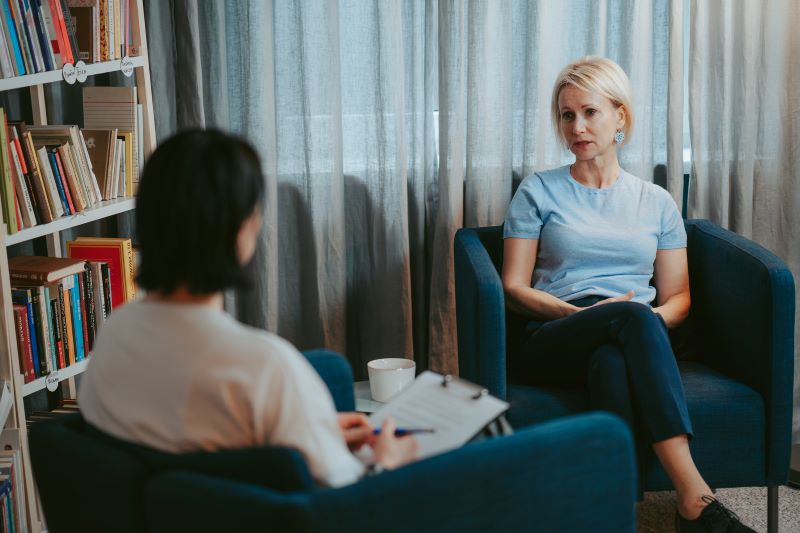
Let's talk about the latest research projects you are involved in. Which of them would you like to praise yourself and your team for?
We have carried out an unprecedented set of studies in Latvia on a specific infection and its causative agent, which is a topic of real concern to us in Latvia - tick-borne encephalitis. We have studied it from A to Z, and we are now at the letter Z in our research. Tick-borne encephalitis definitely is, has been, and probably will continue to be a problem in Latvia. Our country is endemic, and you can get bitten by a tick in a park in the centre of Riga - it doesn’t always happen in the forest or in your backyard. All three subtypes of tick-borne encephalitis are present in Latvia, there is widespread recognition and awareness of the disease, and vaccination coverage is quite high, so we have everything we need for research - we just need to carry it out.
In this case, I would like to commend the successful cooperation with the industry. Latvia does not have a lot of money for research, either in the national research programme or elsewhere and we can’t always compete in European calls for projects in this field. We are glad that it was possible to get a grant - the researcher came with their idea and proved why it is important to study the topic and the industry representative was also interested in the topic to some extent. Industry representatives invest money without having any influence on the research process or results. Of course, we also state in our publications that there has been such a collaboration, it is not commissioned research.
Since 2016, we have already conducted five large-scale studies on tick-borne encephalitis and are planning a new study on the impact of tick-borne encephalitis in children. But overall, we have studied topics related to the disease from many different angles. For example,
we studied the distribution and types of the tick-borne encephalitis agent and went to forests throughout three seasons to collect ticks together with colleagues from Germany.
It is very interesting to work together with experts, biologists and laboratory specialists. They can analyse everything in their laboratories in great detail, which is unfortunately not possible here in Latvia. Of course, I should mention that international cooperation is very important. We are lucky to have such international colleagues who have also become our friends to some extent.
Latvia is small enough, there are a lot of patients, so our studies are national or population-wide. They are therefore more valuable than studies carried out in a single hospital or region. This allowed us to conclusively study the efficacy of the vaccine, which gives me and my team great pleasure. Similarly, we are not alone in conducting European HORIZON research – it involves many countries. We are jointly conducting innovative research on signature-based diagnostics*. Specifically, we are trying to create tools** to be able to diagnose serious infections faster and more accurately, not by looking for the infectious agent, but by looking at how a person’s genes react to certain infections or groups thereof. For example, using blood tests to determine how a person’s genes will respond to an infection - which genes are switched on and which are switched off. By collecting large amounts of blood samples from around the world, we look for what is common to, say, whooping cough, tuberculosis, malaria, a specific virus.
The main benefit is the ability to quickly identify the exact cause of a fever and start appropriate treatment. During the study, we developed a biomarker test that will allow blood tests to determine whether a fever is caused by a viral or bacterial infection as accurately as possible, so that the necessary treatment can be started quickly. The body reacts differently to elevated temperature depending on the type of disease and infection - some of the genes that code these processes are switched on and others are switched off to ensure the body’s protective processes. This process can be detected using biomarkers. By analysing these biomarkers, it is possible to determine the cause of the disease.
In practice, we often conclude what the real cause is through a process of exclusion, but here, with this one analysis, one tool, we may be able to gain a practical benefit for medicine. We have just finished a year-long pilot study at the Children’s Hospital, but I can’t speak about the results yet.
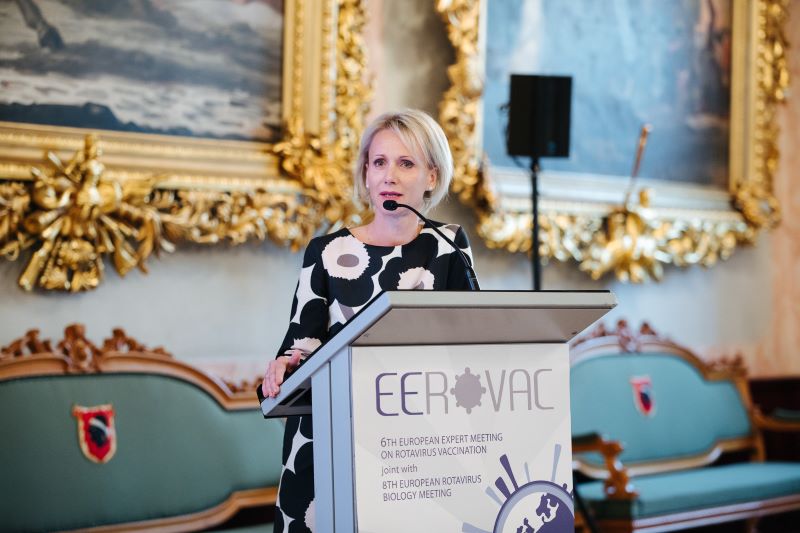 ‘I was the host of an international conference on rotavirus that took place in Latvia,’ Dace Zavadska says commenting on this picture where she is standing behind a podium, addressing attendees.
‘I was the host of an international conference on rotavirus that took place in Latvia,’ Dace Zavadska says commenting on this picture where she is standing behind a podium, addressing attendees.
Besides this study, what else do you have in your sights?
I am a paediatrician and an infectologist and interested in the subject of infections in children. I am very happy to work every day at the children’s hospital, but life has put me in a position where half of my work is related infectology - immunisation. Then the COVID-19 pandemic happened... And perhaps when people hear my name, the first thing that comes to mind is the connection with vaccines, not with infections.
Finally, we have been able to attract a European (EU4Health) project specifically related to immunisation. The two-and-a-half-year project is called EUVABECO (European Vaccination Beyond COVID) and it is dedicated to studying problems related to vaccination. RSU is a partner and the leader of the expert advisory board group, and I am both the scientific leader of the project in Latvia and an active member of the project steering group.
The EUVABECO project aims to provide EU Member States with evidence-based and successfully tested good practice implementation plans, so that they can use these plans in the future to implement the practices discussed in the project or other similar practices that would be relevant for routine vaccination. In the event of a future crisis, these practices would also apply across borders, in different geographies and jurisdictions.
The results of the analysis can be adapted to the current situation and piloted in other countries. We will also conduct a pilot project on three tools in Latvia: a clinical decision system, an electronic product user manual, and a portable digital vaccination card. If they prove to be effective, we will develop a manual on implementing them. These will be recommendations focused on health care, on public health, so that the necessary steps are easy and effective. Because God forbid another similar crisis happens... At least then we would have effective tools to quickly understand what and how to report, how to enter information into systems and retrieve it.
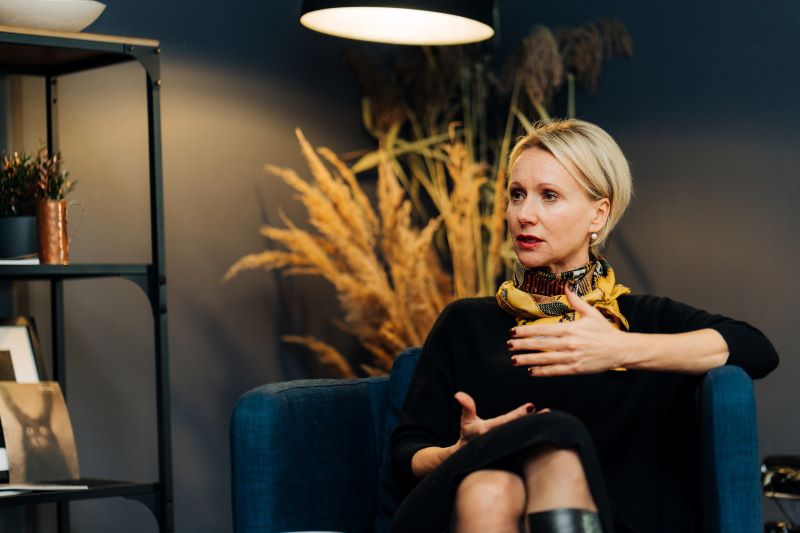
Before being involved with vaccination, about fifteen years ago, I think you were better known to new mothers as an expert on breastfeeding. You taught courses for breastfeeding specialists and counselled and encouraged mothers... Do you still work with this topic?
No, I don’t, but it was very close to me. At that time, we actually brought global trends to Latvia. Now the topic of breastfeeding and support for it is self-evident. The time when I focused more on breastfeeding coincided with the time when I was expecting my eldest daughter and we were developing a programme on breastfeeding with wonderful lecturers. Prof. Ieva Ranka, who is sadly no longer with us, and Asst. Prof. Jevgēnija Livdāne, two wonderful teachers and individuals, involved me as a young student in promoting breastfeeding and educating people on this topic. It was a wonderful time! And if I happen to come across a mother with breastfeeding problems, or if I see that there are difficulties, my interest is immediately reawakened and I am willing to help and explain. However, I no longer actively consult or teach on this topic.
Before you settled on paediatrics and infectology, you considered a residency in psychiatry...
That’s true. I volunteered at the Rīga Psychiatry and Narcology Centre and I was very impressed and inspired by the lecturers in the cycle and how they lectured on psychiatry. For some time, I seriously thought about choosing this specialisation for my residency. But I also have to thank my husband, because he recognised that it wouldn’t suit me, even though we hadn’t known each other that long yet.
I started my paediatric residency quite late - only in my fifth year of studies, even though I had to choose this field already in my third year. Then I specialised in infectology.
What effect has the pandemic had on young doctors’ interest in infectology?
I work with both students and residents every day. It seems that there is no general increase in interest in undergoing an infectology residency in Latvia. I think the COVID-19 pandemic was a coin with two sides. It showed that work in infectology is interesting and dynamic. It’s interesting from a professional point of view, and infectologists will always be needed because there have and will always be infections. However, it was hard during the pandemic. You realise that there is a new infection, but you don’t have the tools to help people who are very sick... There was also a lot of negativity, and maybe it scared some people, although, you can experience negativity in any medical speciality.
What did the COVID-19 pandemic change or strengthen in you – professionally and personally?
[Draws in breath.] A lot of things! It had a big impact on me. Challenging is the first word that comes to mind, both professionally and personally. I had to learn a lot of new information and separate the wheat from the chaff in a very short period of time. [Voice becomes stern.]
I had to make decisions using the level of knowledge available in the world at that time, decisions that were not always well received by the public.
I learned to stand my ground and not give in to political pressure. This is very important for doctors and researchers, whether the pressure comes from government or industry policy makers. I also had to deal with myself. Yes, it was a big learning curve for me as a doctor, as an infectologist, as a somewhat public person at the time. At the same time, I felt that I had a lot of trust from my colleagues and the public - it’s a huge responsibility. That’s why I emphasise that you need to stand your ground and be able to learn new things. And, of course, I was saved by my international network of peers.
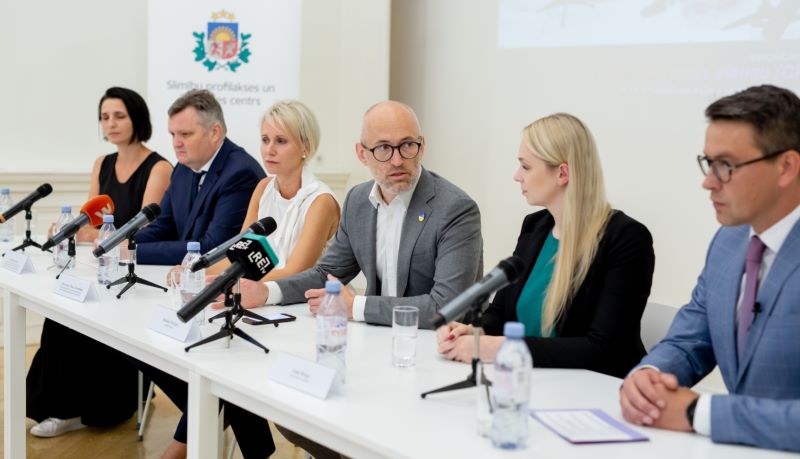
I have to say that this research network took time to develop. When I was young, I was sent to expert meetings, to conferences, and that’s how I slowly started to grow my professional circle. I believe that alongside self-evident things like respect and kindness, the following principle should also be observed - if you promise someone something, make sure you follow through and do so to the best of your ability. Brace yourself and do it, build relationships. It is a marathon, the results do not come after six months or a year, it bears fruit after several years. My personal contacts have more or less made it possible to attract research to Latvia, to the University. It is therefore very important to maintain one’s reputation, not to damage or lose it. That’s why I always try to explain everything to my international peers in a clear and polite way, because they don’t see me as just me - they see me as a representation of Latvia. And this has always been very important to me, because I realise that I am not representing just myself or just RSU, I am representing Latvia. I am a great patriot in general and a nationalist in some ways. It is important to me what my colleagues think about Latvia, what we are like here, how much we can be relied on, what we know, what we can do and what we are capable of.
Are there representatives of any countries with whom you have a particularly good compatibility?
Yes! I have become friends with my German peers, whom I got to know through my research on tick-borne encephalitis and meet outside of work, as well as Austrian peers. I also have friendly relations with my Dutch colleagues. I really like my British colleagues - I learn from them, I ask them for advice, and I really like the way they communicate. It is very respectful and kind. They communicate without being aggressive, I really don’t like aggressive people.
I assume that you saw a lot of aggressivity during the COVID-19 pandemic...
Yes, I was forced to.
I understand that there were real threats against you and that the police had to be involved.
Yes, indeed...
And how did you deal with it emotionally?
Not being on social media helped me a lot. If I needed to meet someone or find something out, I could call them or find them in some other way. It helped me a lot at that moment. My family also helped. They were one for all and all for one - both of my daughters, my husband, my mother were very supportive and helpful. My husband is a lawyer, and he could also tell me a lot in a purely pragmatic, cool-headed way. And steer me when needed, or defend me if necessary.
I sense from other interviews that family is very important in your life.
Of course!
How do you reconcile your professional and family lives? Being a doctor is very demanding, but you also have research and your family. How do you find the right balance?
[Speaks more slowly, deliberating.] It is certainly not easy. When I talk to peers outside work, both here in Latvia and abroad, I see that we are all in the same boat. We have the same problems and challenges – predominantly time. Being away from home, having work on your mind instead of on your home life is something we all have in common. My daughters, my husband and my mother have certainly suffered from it to some extent, but at the same time they have understood the situation, they have supported me. Of course, if there was a critical moment in my life when I had to choose, I would definitely choose my family. I am grateful that I have not had to face such a choice.
What energises you in your free time?
Travel, different types of traveling, definitely comes first. We are about to go on a family trip (the conversation takes place in August - author). Although one of our daughters now lives independently and my husband and I could travel alone, we still go on a two-week trip at the end of summer as we have done for the past ten years. We don’t bring a computer with us on these trips, we’re just there for each other, laughing, playing games, relaxing, going out for dinner and talking. Despite our busy schedules, different responsibilities and interests, we plan this special time to be together. I don’t know how long all four of us will be able to free up two weeks to spend together. Sometimes I travel with the girls and my mother, or just the two of us with my husband.
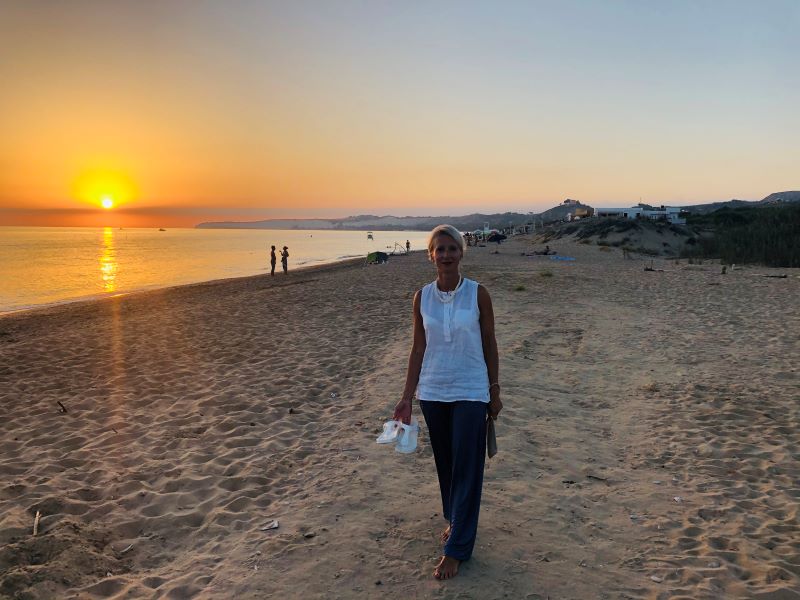 Prof. Zavadska walking on the beach at sunset. 'We have enjoyed our family vacations to our beloved Sicily for seven summers.'
Prof. Zavadska walking on the beach at sunset. 'We have enjoyed our family vacations to our beloved Sicily for seven summers.'
I’m a city girl, born and raised in the city, but for the last ten years or so my husband and I have been trying to learn a bit about life outside of Riga. I’m starting to like it more and more, and this year I spent one week of my vacation in my garden, simply enjoying being there.
After writing and rereading the interview, I noticed that Prof. Zavadska often chooses the word ‘yes’. This energy is in line with what she once said about being able to solve various problems. After our interview, I therefore sent her the following question: is it your way of life to say ‘yes’ to challenges?
Yes, definitely! Most often, my way of life is to ‘say yes’. To accept challenges. Within reason, of course. Even if it seems impossible at first, think about it and try anyway. I definitely agree to and can relate to the saying “what doesn't kill you makes you stronger”, whatever psychologists or therapists say about it. But I am also slowly learning to say ‘no’.
* A rapid test to diagnose severe illnesses such as sepsis and meningitis, using personalised gene signatures.
** PERFORM (Personalised Risk assessment in Febrile illness to Optimise Real-life Management across the European Union) is a study to reduce child mortality by improving early diagnosis, treatment outcomes and prevention of life-threatening infectious diseases using modern molecular biology, cytometry and immunogenetics methods.
The second, follow-up study is part of the HORIZON 2020 programme - DIAMONDS (Diagnosis and Management of Febrile Illness using RNA Personalised Molecular Signature Diagnosis), which aims to reduce child and adult mortality and promote health by improving early diagnosis of infectious and inflammatory diseases, thus facilitating timely and adequate treatment thereof, using a novel personalised medicine approach to infectious and inflammatory disease diagnosis based on individual RNA signatures detected in blood.
Related news
 One sweet day a week, fluoride toothpaste, and a personal dentist… RSU dental researchers’ recommendations for oral healthResearch, Dentistry, oral medicine
One sweet day a week, fluoride toothpaste, and a personal dentist… RSU dental researchers’ recommendations for oral healthResearch, Dentistry, oral medicine


